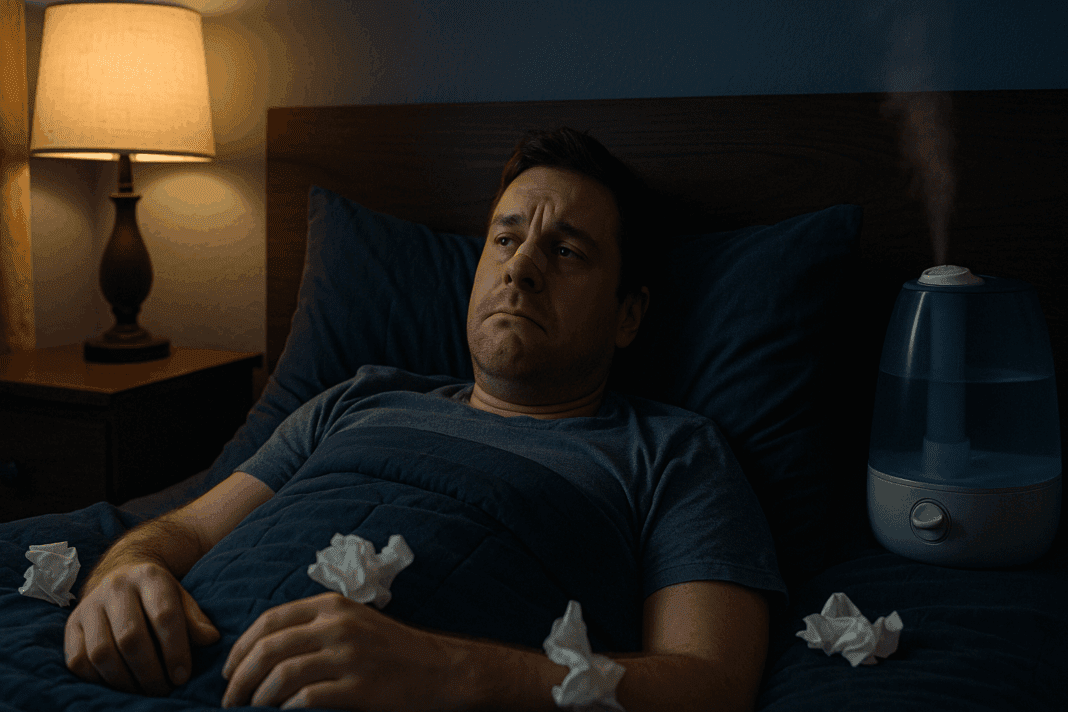Few things are as frustrating as trying to get a good night’s sleep only to find your breathing obstructed by stubborn nasal congestion. If you’ve ever tossed and turned, wondering why you’re dealing with stuffy sinuses at night, you’re not alone. This seemingly minor issue can be incredibly disruptive, interfering with sleep quality, mood, and even overall health. While it’s easy to blame seasonal allergies or a cold, the causes behind nighttime sinus congestion are often more nuanced. In this article, we’ll delve deeply into the many surprising reasons behind nocturnal nasal blockage and discuss evidence-based strategies to relieve your symptoms and breathe freely again.
You may also like: Essential Insights into Natural Treatment for Allergies and Sinus That Actually Work
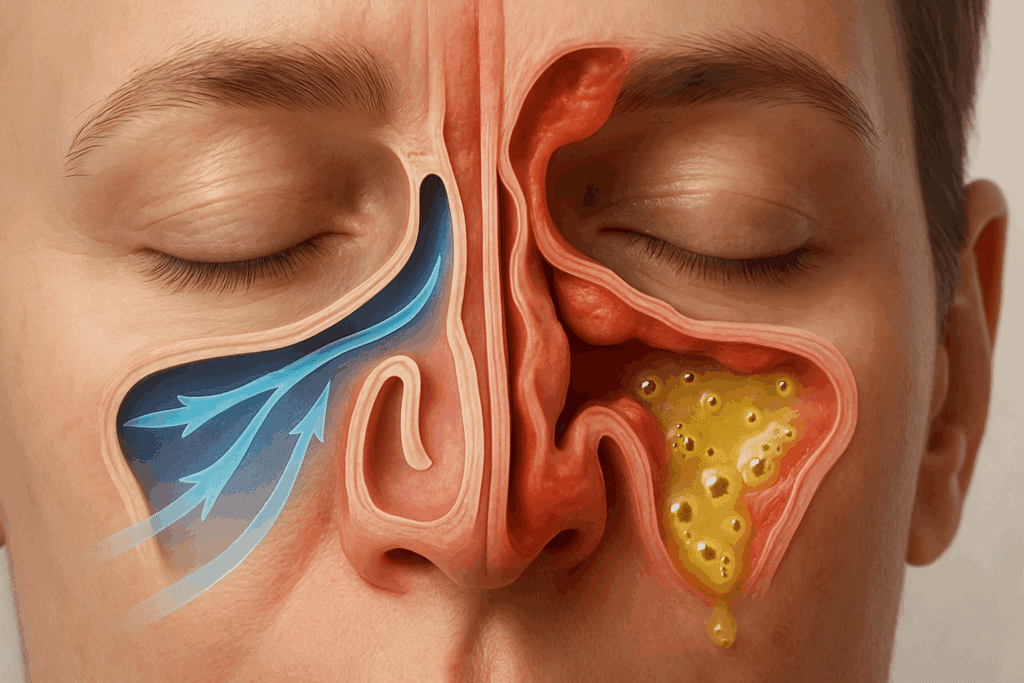
Understanding Nasal Physiology and Congestion
To comprehend why your sinuses might become problematic during the night, it’s essential to first understand how the nasal passages function. The nose acts as both a filter and humidifier for incoming air, playing a critical role in respiratory defense and air conditioning. Mucus membranes within the sinuses produce secretions that trap pathogens and particulates, while cilia help sweep this mucus toward the throat for expulsion.
Congestion occurs when the tissues lining the nose become swollen due to inflammation, increased mucus production, or both. This inflammation may stem from various sources: allergens, infections, irritants, or structural abnormalities. Nighttime exacerbation often relates to posture, environmental exposures, or changes in physiological regulation during sleep. When you lie down, blood flow increases to the upper body, potentially leading to vascular swelling in the nasal passages. This change can magnify any existing congestion, making symptoms feel worse compared to daytime.
Postural Effects: Why Lying Down Can Clog Your Nose
One of the simplest yet most overlooked explanations for a stuffy nose at night lies in gravity. When you are upright during the day, mucus drains more efficiently through the nasal passages and into the throat. However, when you lie down, drainage slows significantly. This stagnation allows mucus to build up, making your nose feel clogged.
Additionally, lying flat increases blood volume in the upper body. This vascular shift can cause the blood vessels in your nasal passages to expand slightly, narrowing the airway. People who already experience mild daytime congestion may find that these anatomical changes worsen their symptoms during sleep. This is especially true for individuals with structural issues like a deviated septum or enlarged turbinates, where even a slight swelling can completely obstruct airflow.
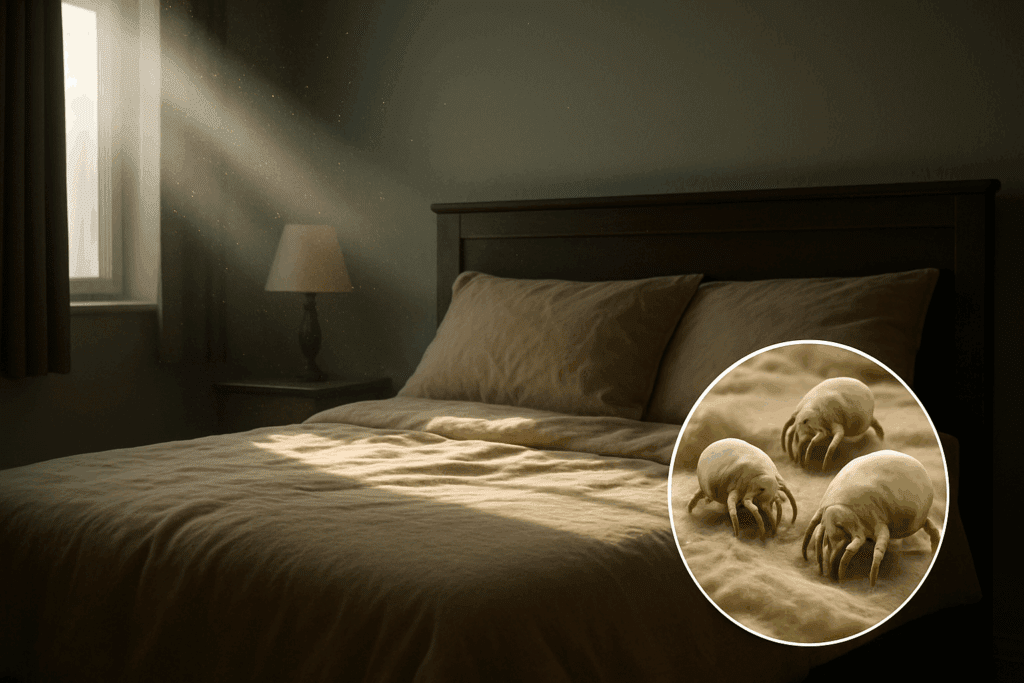
The Connection Between Allergies and Stuffy Sinuses at Night
Allergies are among the most common causes of nasal congestion, but many people are unaware of the nocturnal implications. Exposure to dust mites, pet dander, mold, and even cockroach particles tends to intensify at night, particularly in poorly ventilated bedrooms. Bedding materials like pillows, mattresses, and duvets can act as reservoirs for allergens, exacerbating immune responses just when you’re trying to rest.
When your immune system perceives an allergen, it releases histamine, which triggers inflammation and increased mucus production. This histamine response contributes significantly to the sensation of a blocked nose. Furthermore, studies suggest that histamine levels may follow a circadian rhythm, with natural peaks during nighttime hours. As a result, allergy sufferers often find that their symptoms flare up after the sun goes down, contributing to persistent and frustrating congestion.
Environmental Triggers in Your Bedroom
While allergens play a key role, they are just one subset of environmental factors that can lead to stuffy sinuses at night. Indoor air quality can be compromised by pollutants such as cigarette smoke, volatile organic compounds (VOCs) from paint and cleaning products, or even fumes from scented candles. These irritants can inflame nasal tissues and lead to chronic congestion.
Humidity also plays a pivotal role. Dry air can irritate and dry out the mucosal linings of the nose, making them more susceptible to inflammation. Conversely, overly humid conditions promote mold growth and dust mite proliferation. Ideally, maintaining indoor humidity between 40% and 60% helps keep nasal passages comfortable and minimizes exposure to microbial irritants.
The Impact of Sinus Infections and Chronic Rhinitis
Not all nasal congestion is caused by allergies or environment. Infections and chronic inflammatory conditions such as chronic rhinosinusitis can also result in persistent symptoms, including stuffy sinuses at night. When sinus tissues become infected, they swell, produce thick mucus, and can become partially or fully blocked. This is often accompanied by facial pain, pressure, and reduced sense of smell.
Chronic rhinitis, which includes both allergic and non-allergic subtypes, involves long-standing inflammation of the nasal mucosa. Non-allergic rhinitis may be triggered by temperature changes, strong odors, or hormonal fluctuations. In either case, nighttime symptoms can become particularly troublesome due to the interplay between sleep-related body changes and persistent mucosal swelling.
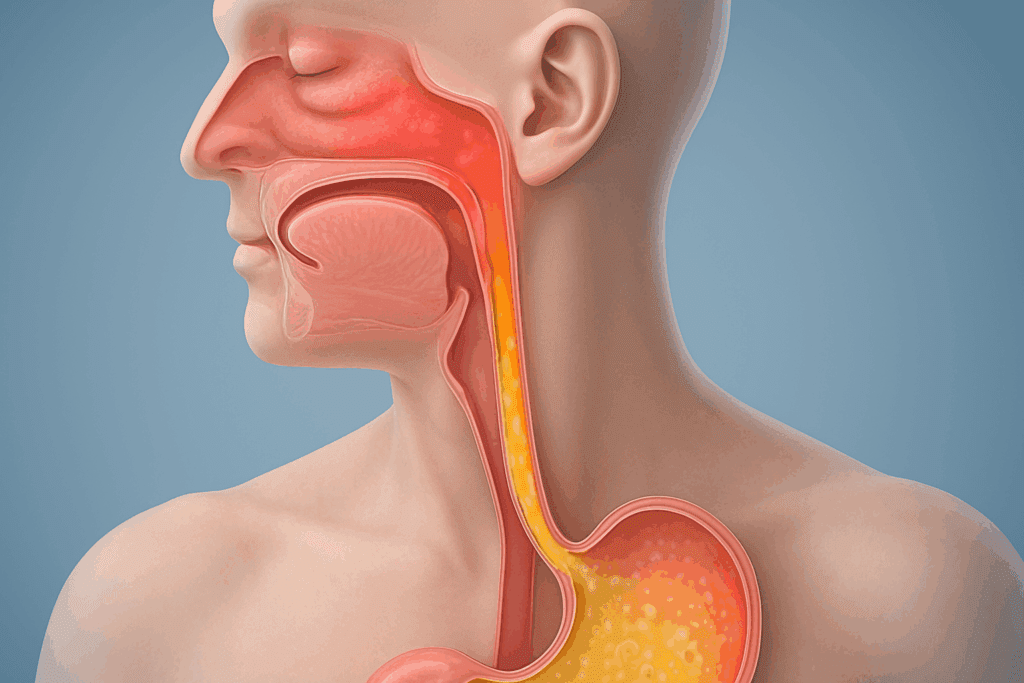
How Gastroesophageal Reflux Disease (GERD) Influences Nasal Congestion
One of the less obvious but medically acknowledged contributors to nasal congestion is acid reflux. Gastroesophageal reflux disease (GERD) occurs when stomach acid travels backward into the esophagus, sometimes reaching the throat and nasopharynx. This phenomenon, known as laryngopharyngeal reflux, can irritate the upper airway and cause postnasal drip or nasal inflammation.
When lying down, the lack of gravitational resistance makes it easier for acid to reach these sensitive upper regions. Inflammation of the throat and nasal passages can follow, leading to symptoms often misattributed to allergies or colds. If you experience both nighttime congestion and signs of reflux such as heartburn or chronic throat clearing, GERD may be playing a role in your nasal symptoms.
Hormonal Influences on Nighttime Nasal Blockage
Hormonal changes are another less discussed but significant factor that can influence nasal congestion. During pregnancy, increased levels of estrogen and progesterone can lead to swelling of the nasal membranes, even in the absence of allergens or infection. This condition, often termed pregnancy rhinitis, may worsen at night and disrupt sleep quality.
Similarly, hormonal fluctuations during the menstrual cycle can temporarily affect nasal airway resistance. Estrogen has been shown to increase vascular permeability, which can lead to swelling of mucosal tissues. For some women, this results in periodic stuffy noses, especially during the luteal phase of their cycle. Hormonal effects are subtle but can become problematic when compounded by other contributing factors like posture or environmental irritants.
Unmasking the Link Between Sleep Apnea and Sinus Congestion
Sleep apnea is a condition characterized by repeated episodes of breathing interruption during sleep, often due to airway obstruction. While this disorder is primarily associated with throat and tongue collapse, nasal congestion can worsen its severity and frequency. People with obstructive sleep apnea often report experiencing a congested nose at night or a nose clogged when lying down.
Sinus congestion can increase upper airway resistance, making it harder to breathe through the nose. This encourages mouth breathing, which may lead to snoring and fragmented sleep. In individuals using CPAP machines for apnea treatment, nasal blockage can reduce compliance or make mask fitting difficult. Addressing nasal congestion is therefore a critical component of comprehensive sleep apnea management.
Does a Stuffy Nose Mean You’re Sick? Not Always
One of the most common misconceptions is that a stuffy nose automatically indicates illness. While viral infections like the common cold or influenza are well-known triggers of nasal congestion, they are far from the only causes. As we’ve explored, allergies, environmental irritants, posture, and even hormonal shifts can all contribute.
Understanding what causes a stuffy nose in your specific case requires careful attention to timing, associated symptoms, and response to interventions. For instance, if congestion worsens at night but improves during the day, environmental or positional factors may be at play. If it persists alongside fatigue and body aches, an infectious cause is more likely. Either way, it’s essential not to jump to conclusions and instead consider a range of possible explanations.
The Physiological Basis of Why Your Nose Gets Stuffy at Night
Delving deeper into nasal physiology reveals that congestion is not solely a matter of mucus overproduction. The nasal cycle, a natural process where airflow alternates between nostrils every few hours, plays an integral role. This cycle is regulated by the autonomic nervous system and can influence perceived airflow even when there is no physical obstruction.
At night, the body’s parasympathetic tone dominates, promoting relaxation but also enhancing nasal membrane permeability. This effect, combined with horizontal posture and potential allergen exposure, can cause one or both nostrils to feel blocked. Recognizing the role of the nasal cycle helps explain why you may experience alternating congestion patterns or why symptoms seem to come and go.
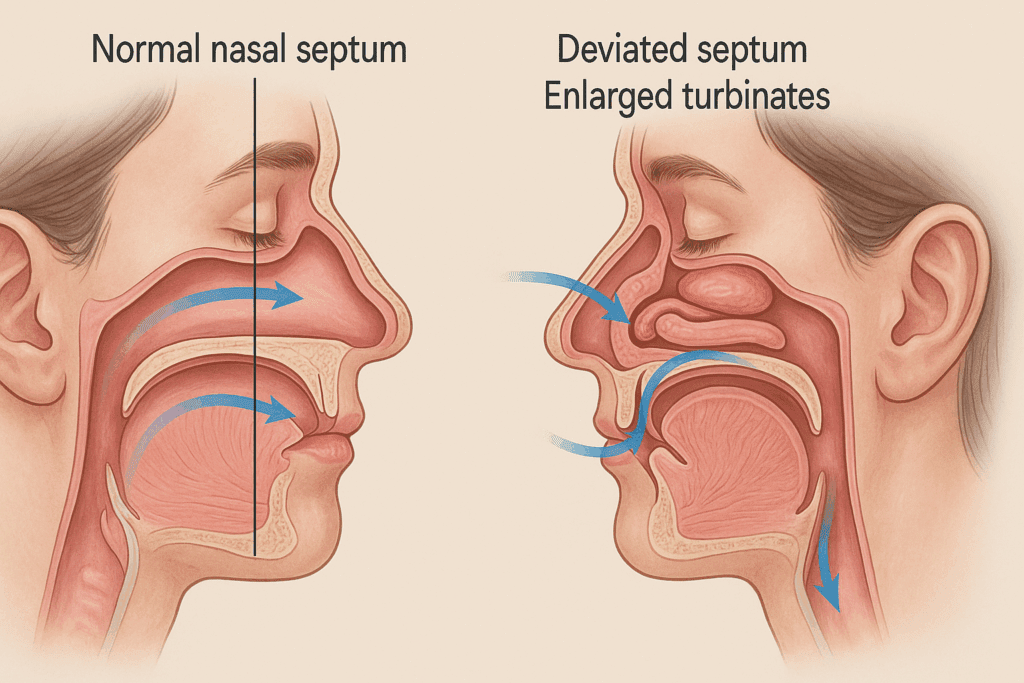
Stuffy Sinuses at Night: The Role of Structural Abnormalities
Structural issues within the nose can also be to blame when you experience stuffy sinuses at night. A deviated septum, which occurs when the thin wall between nostrils is crooked, can significantly affect airflow. In some cases, the deviation is so severe that one side of the nose remains consistently blocked, especially when lying on the affected side.
Enlarged turbinates—bony structures within the nasal passages covered in mucosal tissue—can also contribute. These structures help warm and humidify air but may become chronically swollen due to allergies or infections. Nasal polyps, benign growths in the sinus cavities, are another potential cause. In all of these scenarios, the combination of anatomical restriction and nighttime physiological changes amplifies congestion.
What Causes Nose Congestion: Exploring the Complex Triggers
Nasal congestion arises from a variety of mechanisms that extend beyond mucus buildup. Inflammation, vascular changes, glandular activity, and structural differences all contribute. When these mechanisms intersect, such as during allergy season or in a moldy bedroom, the effect can be compounded and more difficult to resolve.
Understanding what causes nose congestion in your case requires a multi-faceted approach. It may involve allergen testing, imaging studies to detect structural issues, and trials of lifestyle modifications. By identifying the primary drivers, whether they be environmental, infectious, or anatomical, tailored treatments become far more effective and sustainable.
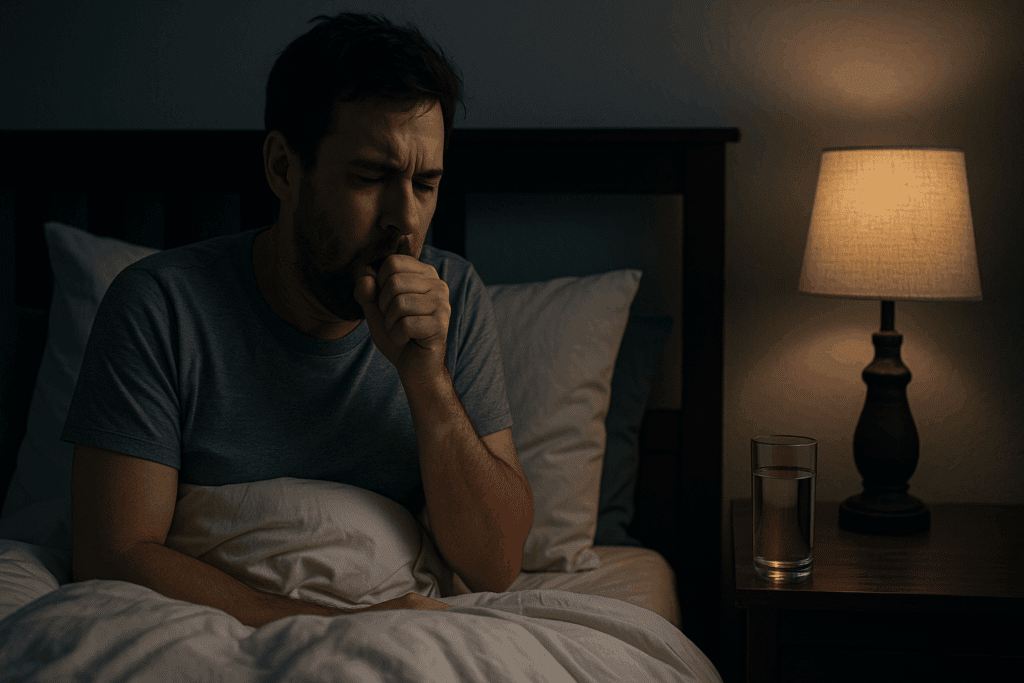
The Relationship Between Stuffy Sinuses at Night and Cough
For many people, a clogged nose and cough go hand in hand, especially during nighttime hours. Postnasal drip—the process by which excess mucus drains into the throat—can trigger coughing, especially when lying down. This can create a feedback loop where nasal congestion worsens due to throat irritation, leading to more coughing and mucus production.
The problem becomes more pronounced in individuals with preexisting respiratory issues like asthma or chronic bronchitis. In such cases, addressing nasal symptoms can lead to a marked improvement in cough frequency and intensity. Using saline nasal sprays, elevating the head during sleep, or employing HEPA filters in the bedroom can be helpful in breaking this cycle.
Why Is My Nose Congested or Cold at Night?
Some people experience not just a blocked nose but a sensation of nasal coldness at night. This can be due to nerve sensitivity in the nasal passages, often triggered by dry or cool air. Air conditioning units, fans, or open windows can direct cold airflow into the nasal cavity, irritating nerve endings and creating a perception of a cold or blocked nose.
Interestingly, this symptom does not always correspond to visible mucus or swelling. The sensation of coldness may be purely neurological, related to how the brain interprets temperature changes in the nasal tissue. For individuals facing this issue, warming the air with a humidifier or wearing a breathable mask at night may help alleviate discomfort.
Why Is My Nose Clogged When Lying Down? Explaining the Positional Link
As previously mentioned, lying down can significantly impact nasal physiology. Gravity no longer aids in mucus drainage, and increased blood flow to the head can exacerbate existing inflammation. For individuals with mild allergies, this can mean the difference between a manageable daytime symptom and a frustrating nighttime ordeal.
If your nose is consistently clogged when lying down, consider elevating the head of your bed by several inches or using a wedge pillow. This small adjustment helps improve drainage and reduces vascular pooling in the nasal passages. Combined with other environmental controls, such as allergen-proof bedding and consistent bedroom cleaning, this can substantially reduce nighttime symptoms.
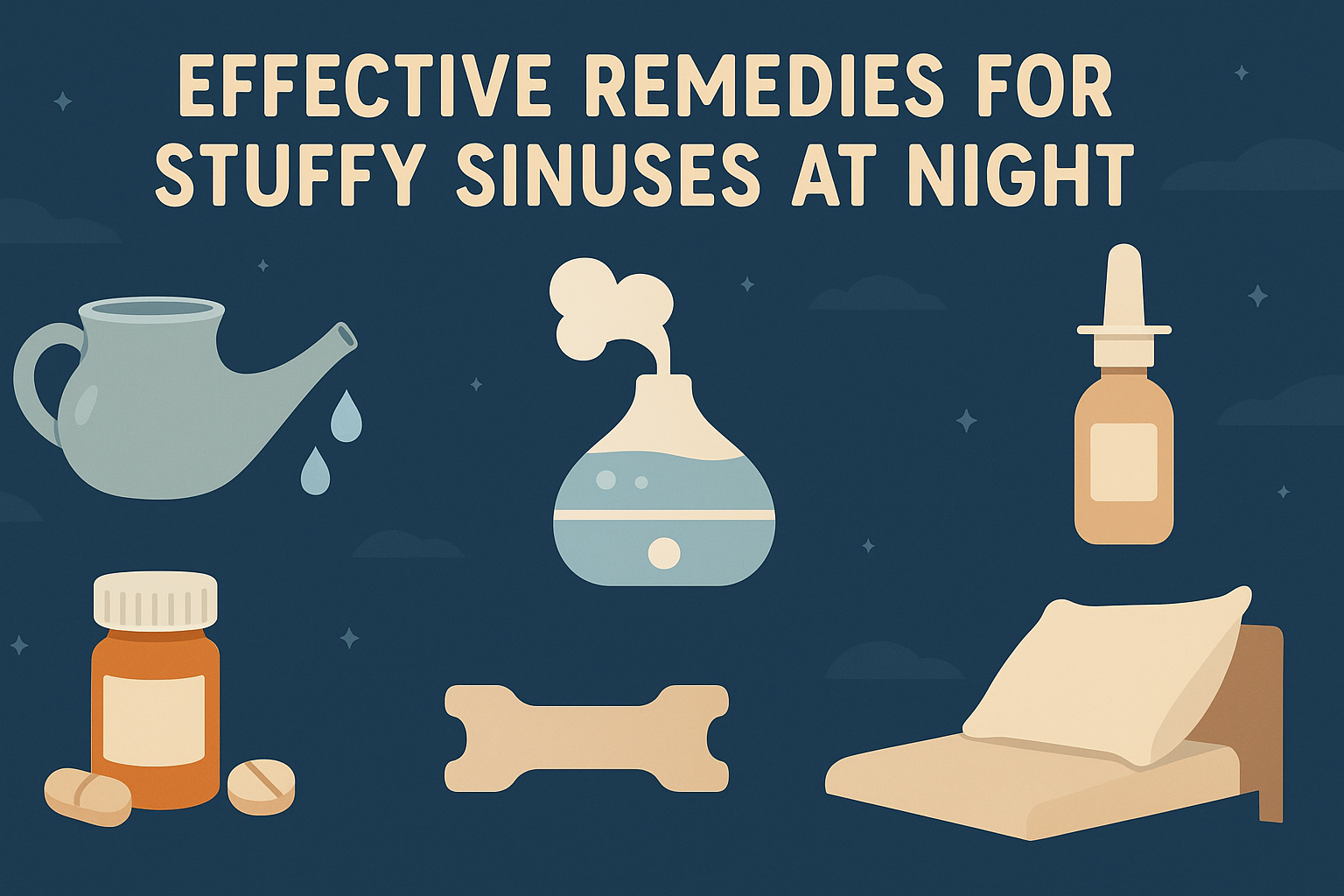
Effective Remedies for Stuffy Sinuses at Night
There are numerous strategies for managing nighttime sinus congestion, ranging from over-the-counter medications to lifestyle changes. Antihistamines and nasal corticosteroids are commonly used for allergy-related symptoms, while decongestants offer temporary relief by shrinking swollen blood vessels. However, long-term use of decongestant sprays should be avoided due to the risk of rebound congestion.
Non-pharmaceutical interventions include using saline nasal sprays or rinses to flush out allergens and mucus, employing HEPA filters to clean indoor air, and maintaining optimal humidity. Nasal dilator strips may provide immediate mechanical relief by opening nasal passages. Identifying and removing potential irritants such as strong perfumes, cigarette smoke, or pet dander can also be transformative.
Dietary Considerations and Hydration
What you eat and drink can also impact sinus health. Spicy foods like chili peppers can temporarily open nasal passages by thinning mucus, while dairy products may thicken it for some people, though evidence is mixed. Staying well-hydrated ensures that mucus remains fluid and easier to expel.
Certain nutrients, such as vitamin C, quercetin, and omega-3 fatty acids, possess anti-inflammatory properties that may help reduce nasal swelling. Including these nutrients in your diet may improve overall immune function and reduce the frequency or severity of congestion episodes. Herbal teas containing ginger, peppermint, or eucalyptus can provide soothing effects and promote clearer nasal passages.
When to Seek Medical Advice for Chronic Congestion
While occasional nighttime nasal congestion is normal, persistent or severe symptoms warrant medical evaluation. If you experience daily congestion that disrupts sleep, is accompanied by facial pain or greenish discharge, or does not respond to typical treatments, consult a healthcare provider. Imaging studies, allergy testing, or referral to an ENT specialist may be necessary.
Conditions such as nasal polyps, chronic sinusitis, or undiagnosed allergies may require more targeted interventions, including surgery or immunotherapy. A comprehensive approach that identifies root causes and customizes treatment plans is often more effective than relying solely on symptomatic relief.
Frequently Asked Questions: Understanding and Managing Stuffy Sinuses at Night
Why do I only seem to experience a clogged nose at night and not during the day?
Experiencing a clogged nose at night but not during the day is surprisingly common and often relates to the body’s natural changes in posture and circulation. When you lie down, blood pools more in the upper respiratory tract, causing the nasal blood vessels to swell and narrow the airways. This shift can intensify any pre-existing inflammation from allergens or irritants. Additionally, your body’s circadian rhythm may heighten histamine release at night, particularly in those with allergies, which further contributes to nasal congestion at night. Environmental factors such as dust accumulation in pillows, temperature drops, or even sleeping in a dry room can exacerbate the feeling of a nose clogged when lying down, which often clears again once you’re upright in the morning.
How are stuffy sinuses at night connected to poor air quality in bedrooms?
Stuffy sinuses at night are often aggravated by unseen environmental factors, including poor indoor air quality. Bedrooms commonly accumulate airborne irritants such as dust mites, pet dander, and volatile organic compounds (VOCs) released from furniture, cleaning agents, or even carpet adhesives. These irritants can silently trigger immune responses, particularly during sleep when breathing becomes more shallow and nasal passages are more exposed to consistent, concentrated air intake. Using air purifiers with HEPA filters and ensuring regular ventilation can dramatically reduce the burden of irritants that contribute to nasal congestion at night. Moreover, keeping humidity between 40% and 60% can help minimize allergen proliferation while maintaining mucosal hydration.
Can emotional stress contribute to a stuffy nose when lying down?
Yes, emotional stress can indeed have physiological effects that result in a stuffy nose when lying down. Stress activates the body’s sympathetic nervous system, potentially increasing inflammation levels throughout the body, including the nasal passages. This systemic inflammatory response may cause the nasal mucosa to swell, leading to nasal congestion that worsens in the horizontal position. Stress also influences sleep quality and hormone regulation, including cortisol levels, which play a role in immune response and inflammation. Practicing stress-reducing techniques such as mindfulness meditation, deep breathing, or progressive muscle relaxation before bed can sometimes alleviate recurring nasal congestion without the need for medications.
What lifestyle changes can help reduce the frequency of stuffy sinuses at night?
Modifying daily habits and nighttime routines can significantly impact the frequency and intensity of stuffy sinuses at night. One effective strategy is to elevate your head while sleeping, which can facilitate mucus drainage and reduce vascular pooling in the nasal passages. Reducing dairy intake in the evening may help for some individuals sensitive to mucus production, although the evidence remains mixed. Avoiding alcohol and spicy foods too close to bedtime may also reduce inflammation and prevent congestion-related reflux. Establishing a consistent sleep routine, staying well-hydrated, and reducing nighttime exposure to allergens—such as by using hypoallergenic bedding and washing linens weekly in hot water—can all help create a more sinus-friendly environment.
How do stuffy sinuses at night affect mental performance and mood the next day?
When you suffer from persistent stuffy sinuses at night, your sleep is often fragmented, leading to inadequate rest and suboptimal REM cycles. Sleep deprivation—even partial—can impair cognitive functions such as attention, memory consolidation, and decision-making. Chronic nasal congestion may also increase the risk of mood disturbances, including irritability, anxiety, and depressive symptoms, due to the stress of poor-quality sleep and impaired oxygenation. Moreover, the brain’s glymphatic system, which clears waste during deep sleep, may not function efficiently if sleep is interrupted by congested breathing. As a result, managing nasal congestion isn’t just about comfort; it directly supports mental health and overall quality of life.
Why does my child experience a congested nose at night even without having a cold?
Children often face a congested nose at night due to a combination of anatomical, environmental, and behavioral factors. Pediatric nasal passages are narrower than those of adults, making them more prone to blockage from even mild inflammation or allergens. If your child is breathing through their mouth or snoring regularly, enlarged adenoids or tonsils may be contributing to nasal obstruction. Environmental triggers like soft toys harboring dust mites or fluctuating humidity levels can also worsen nighttime symptoms. Pediatricians may recommend allergen testing, using hypoallergenic bedding, and avoiding plush toys in bed. It’s also wise to rule out non-allergic rhinitis or chronic sinusitis, which can go undiagnosed for months if symptoms are attributed solely to seasonal illness.
Is there a connection between clogged nose and cough, especially at night?
Absolutely. A clogged nose and cough often coexist, particularly due to postnasal drip. When mucus from the nasal passages accumulates and drains backward into the throat, it can trigger a coughing reflex, especially when lying flat. This cycle becomes more intense at night, where silent reflux, dry air, or undiagnosed sinus inflammation may worsen both the cough and nasal congestion. Nasal irrigation with saline before bed and elevating the head can reduce this drainage and provide nighttime relief. In chronic cases, it’s essential to differentiate whether the cough stems from allergic rhinitis, a sinus infection, or conditions like GERD that mimic or exacerbate both symptoms.
How can you tell if your nighttime nasal congestion is allergy-related or not?
Distinguishing allergy-related nasal congestion at night from other causes often requires evaluating the timing, duration, and associated symptoms. Allergies typically follow a pattern—such as worsening during specific seasons or after exposure to triggers like pet dander or pollen. Symptoms like itchy eyes, sneezing, and watery nasal discharge often accompany allergic responses. In contrast, non-allergic congestion may be more persistent, lacking those hallmark signs, and could stem from irritants, hormonal shifts, or chronic inflammation. A trial of antihistamines or intranasal corticosteroids can help clarify the diagnosis, as can formal allergy testing. Keeping a symptom diary alongside changes in environment or bedding can offer additional insights into potential allergenic causes.
Why is my nose cold or feels oddly chilled during the night?
A sensation of a cold nose at night can be surprisingly bothersome and is not always tied to temperature alone. One explanation involves heightened sensitivity of the trigeminal nerve, which supplies sensation to the nasal area and can overreact to subtle changes in air temperature or humidity. Cool airflow from fans or air conditioning directly aimed at the face during sleep may also irritate nerve endings, creating the illusion of a cold or congested nose even when nasal passages are clear. Moreover, certain medications that affect circulation may cause peripheral vasoconstriction, making the nose feel colder. Wearing a breathable mask or redirecting airflow can help reduce this sensation, especially if it interrupts sleep.
What can long-term nasal congestion at night indicate about my overall health?
Persistent nasal congestion at night may signal more than just environmental or anatomical issues—it could reflect broader systemic health concerns. Conditions such as obstructive sleep apnea, chronic rhinosinusitis, or even autoimmune diseases like sarcoidosis may manifest initially as simple nighttime congestion. If your nasal congestion at night is paired with chronic fatigue, sleep disruption, or recurrent sinus infections, it’s worth pursuing comprehensive diagnostic evaluation. Left untreated, chronic nighttime congestion may reduce oxygen saturation during sleep, increasing cardiovascular risk and impacting cognitive performance. Recognizing the broader health implications of why your nose is congested at night can encourage earlier intervention and more effective long-term solutions.
Stuffy Sinuses at Night and Hidden Triggers in Your Routine
Many people overlook how seemingly benign daily habits can lead to stuffy sinuses at night. For instance, frequent use of scented laundry products or air fresheners can introduce airborne chemicals that linger in bedding and trigger inflammation hours later. Even habits like eating late or consuming wine before bed can provoke mild reflux, exacerbating nasal blockage when reclining. Hidden mold in bathrooms or unwashed HVAC filters may introduce low-level irritants that accumulate silently in the body, becoming most noticeable during the stillness of nighttime breathing. If you’ve exhausted typical treatments and still ask yourself, “Why is my nose stuffy every night?”, consider auditing your entire evening environment and routine for overlooked contributors.
Unlocking Relief from Stuffy Sinuses at Night Through Nasal Hydration and Breath Training
Effective relief from stuffy sinuses at night sometimes requires going beyond medication and focusing on restoring natural nasal function. Regular nasal hydration with a saline mist or rinse can maintain the moisture balance needed for healthy mucosal clearance, especially in dry climates or during heater season. Breath training techniques such as Buteyko breathing or alternate nostril breathing may enhance nasal airflow and reset dysfunctional breathing patterns that contribute to congestion. These methods encourage slow, nose-based breathing and help reduce hyperventilation that worsens nasal dryness and swelling. Understanding why your nose gets stuffy at night may require looking at breathing habits cultivated over years, and retraining the system can be surprisingly effective for long-term improvement.
Breathe Easier: Final Thoughts on Addressing Stuffy Sinuses at Night
Stuffy sinuses at night can be more than a mere annoyance—they may signal underlying issues that deserve attention. Whether caused by allergens, posture, infections, reflux, or structural challenges, nighttime nasal congestion has wide-reaching effects on sleep quality and daily function. Understanding why your nose gets stuffy, what causes nose congestion, and how various factors interplay during sleep is crucial for finding lasting relief.
Rather than accepting nightly congestion as inevitable, take a proactive approach. Modify your sleeping environment, explore over-the-counter and natural remedies, and consult with healthcare professionals when necessary. With the right information and interventions, you can reclaim restful nights and awaken refreshed, breathing freely and fully once more.


